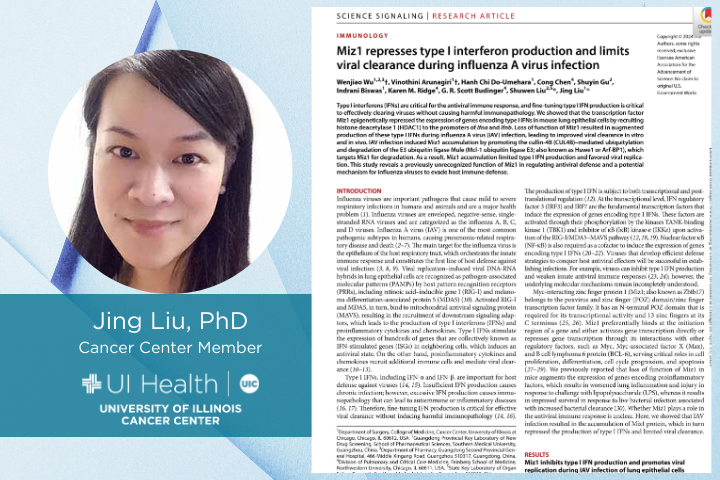
The journal Science Signaling published new research from University of Illinois Cancer Center member Jing Liu, PhD, and authors at the University of Illinois Chicago and other universities.
Liu is a corresponding author on the article, “Miz1 Represses Type I Interferon Production and Limits Viral Clearance During Influenza A Virus Infection.”
Part of the Cancer Center’s Translational Oncology Research Program, Liu’s research focus is studying the molecular mechanisms that govern inflammation in pulmonary diseases. Inflammation is part of the host defense system against invading pathogens, but deregulated inflammation is also known to play a crucial role in the pathology of various diseases, from inflammatory lung diseases to cancer.
In Science Signaling
The abstract in Science Signaling is excerpted below. Read the full paper here.
“Type I interferons (IFNs) are critical for the antiviral immune response, and fine-tuning type I IFN production is critical to effectively clearing viruses without causing harmful immunopathology. We showed that the transcription factor Miz1 epigenetically repressed the expression of genes encoding type I IFNs in mouse lung epithelial cells by recruiting histone deacetylase 1 (HDAC1) to the promoters of Ifna and Ifnb. Loss of function of Miz1 resulted in augmented production of these type I IFNs during influenza A virus (IAV) infection, leading to improved viral clearance in vitro and in vivo. IAV infection induced Miz1 accumulation by promoting the cullin-4B (CUL4B)–mediated ubiquitylation and degradation of the E3 ubiquitin ligase Mule (Mcl-1 ubiquitin ligase E3; also known as Huwe1 or Arf-BP1), which targets Miz1 for degradation. As a result, Miz1 accumulation limited type I IFN production and favored viral replication. This study reveals a previously unrecognized function of Miz1 in regulating antiviral defense and a potential mechanism for influenza viruses to evade host immune defense.”
